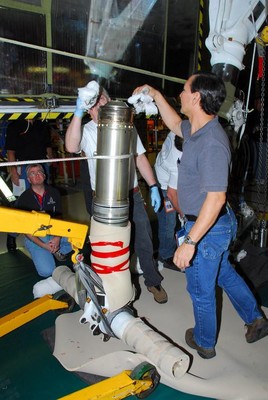
I have just read that the repairs on Discovery’s strut are well under way.
I also found the nice picture showing how the landing gear is being disassembled. If you look closely, you can see the bottom part (right at the floor), where the tires normally sit. And right behind the head of the worker in front of the picture is the upper part of the strut, that one that is still connected to the space shuttle.
I am very glad to see these pictures, because they provide evidence that the repair seems to be on good track. I assume that there are now all needed spare parts available and work can continue to be carried out.
In the mean time, several space forums on the web report that there will probably be a slip in the launch date, but it is not expected to be extreme. So maybe I loose a day or two of “my launch” window, but I think chances are still pretty high I’ll make it. When I first heard about all that, I wondered if I should change my travel plans. Especially air travel to Orlando is a bit problematic. But today everything is unclear. If I move the dates, I’ll probably miss the launch when it is on time (and as of NASA’s official site, there still is a chance). I stay tuned…
Update: I found some new pictures, find them at http://www.gerhards.net/Gallery-sts_120_strut_repair.phtml (thumbs below).










